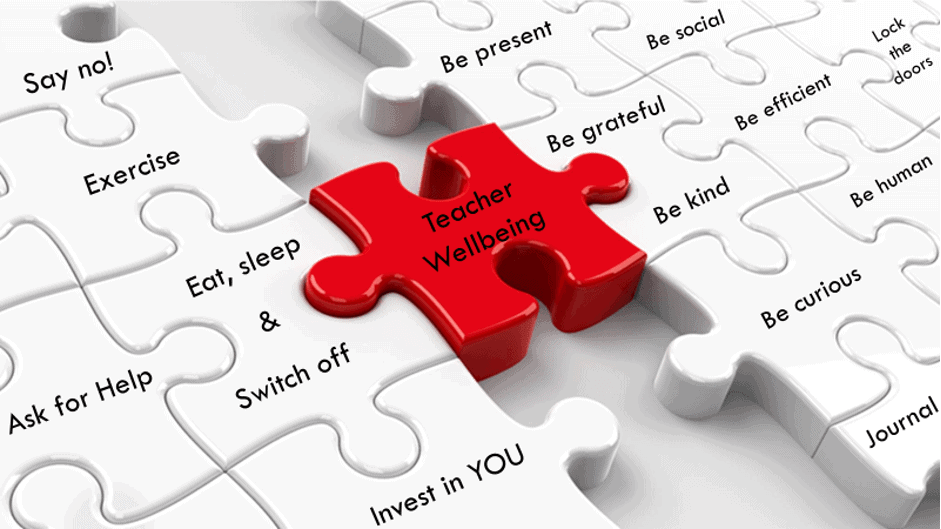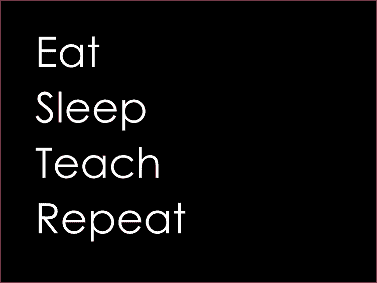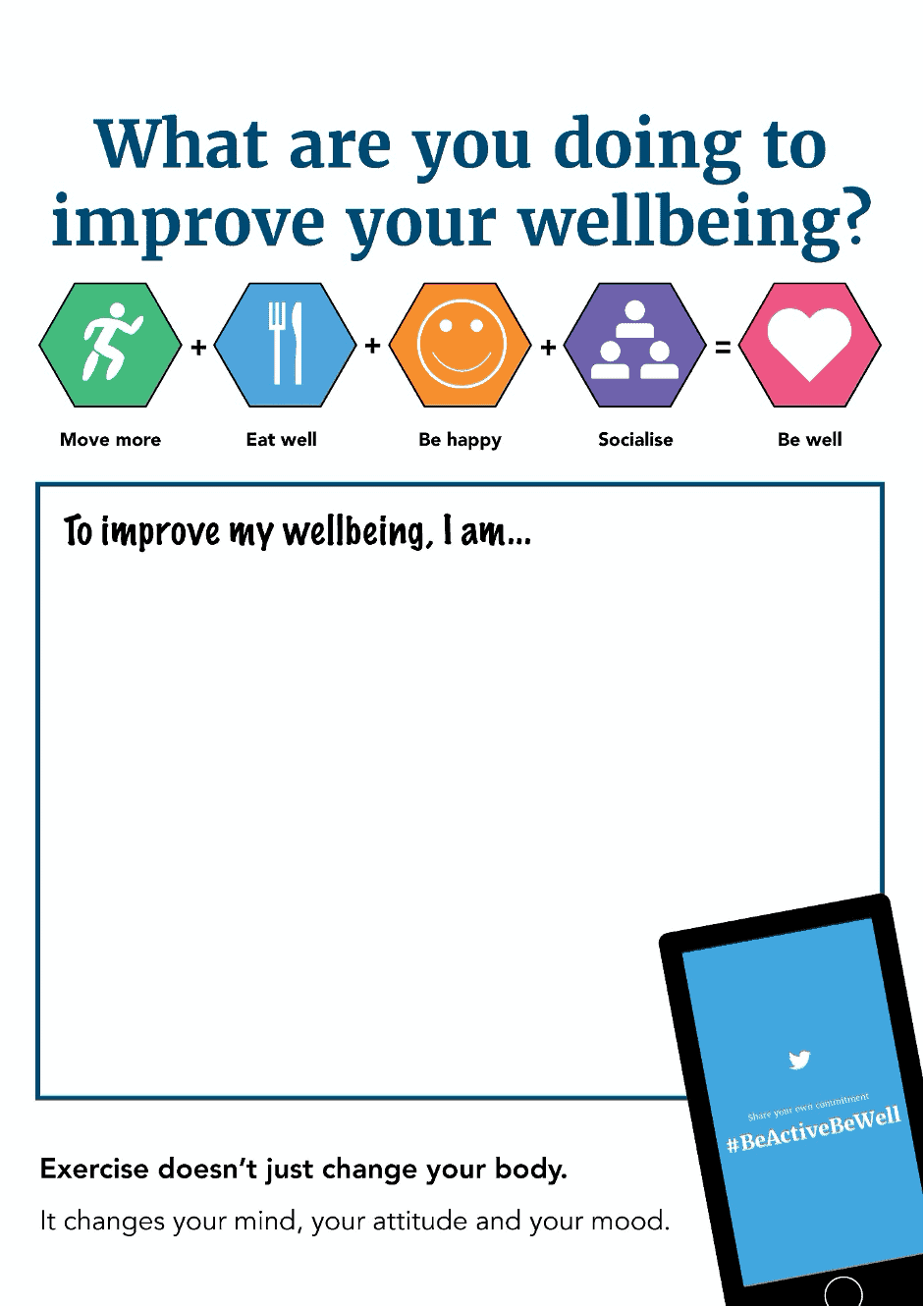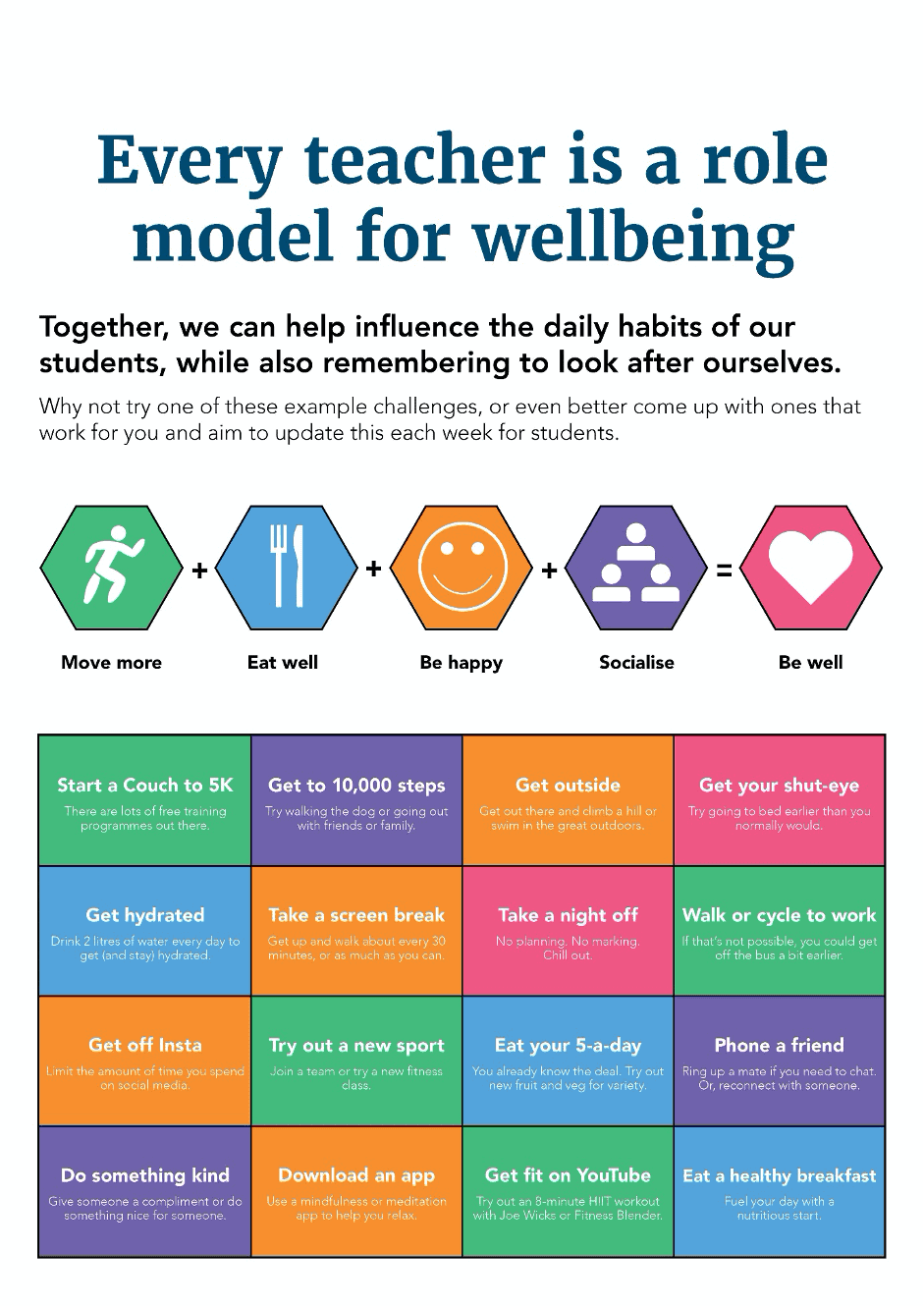
Teaching is an exhausting career at the best of times but 2020 has really tested our resilience and resolve, and 2021 may well be just as challenging. Whilst none of this is rocket science, perhaps the following checklist will help you stay on top of your wellbeing for 2021:
-
Exercise and play

There are so many reasons to build healthy exercise habits into your daily routine and my recent masters level research definitely demonstrated the importance of daily physical activity (DPA) to improve happiness. However, my favourite story about the importance of exercise comes from when Lord Seb Coe was asked if he missed his running during the lead up to London 2012 with so much else to do. The response, Coe identified that he had never needed running more as the place where his best thinking happened and a place to reset ready for the next challenge. As teachers we often feel we are too busy to exercise but if that story is not enough for you then maybe this quote from John Ratey will seal the deal: “exercise is really for the brain, not the body. It affects mood, vitality, alertness, and feelings of well-being”. So, if you want to feel good, be productive and achieve then you absolutely need regular exercise in your life. And, as Stuart Brown articulates in his TED talk and book, play is more than just fun, it is essential for adults, animals and children!
-
Eat, sleep and switch off

We all know a teacher’s work is never done and if you worked until everything was crossed off the to-do list then you would never stop. However, there is a difference between work and quality work. Not only does good nutrition give you energy to function but it also looks after your immune system, so without putting the right stuff inside you are literally a ticking time bomb to collapse. It is so easy to skip meals, snack on junk food, or simply fail to take time to eat properly so maybe you need a Sunday meal prep routine to pack some healthy feel-good food into your life? Perhaps Jamie Oliver needs to do a focus on school meals for teachers too? Read his top tips for healthy nutrition here. Or listen to performance nutritionalist James Collins on the Don’t Tell Me The Score podcast as he explores meal planning and more.
This also feels like the right place to remind us all about the importance of switching devices off early, not having work emails on your phone and even banning phones from the bedroom. As busy teachers we are guilty of burning the midnight oil to mark, plan and catch up on emails but what will really help your ‘performance’ in the classroom is proper rest and recovery (not just in school holidays). Listen to Elite Sport Sleep Coach Nick Littehales on DTMTS as he shares some top tip on the science of sleeping well. Read more from the sleep foundation about the dangerous effects of melatonin here.
-
Invest in you

The more I read about wellbeing and happiness, the more I uncover the importance of looking after yourself. Dan Gilbert, author of “Stumbling of Happiness” (I highly recommend that book too!) shares a lot in his book and on this TED Talk. My biggest takeaway is that, thanks to our prefrontal cortex, we are able to synthesise happiness (i.e. it’s a state of mind not something that comes from riches, power, fame or some other ‘natural’ future). The human brain is actually incredibly bad at predicting what it will enjoy in the future so we really should focus on the process not the product! Life as a verb, forget yet, when and one day! Maybe you should start with this ikigai planning for purpose framework [add link to ikigai blog]?
Want to dig deeper, why not try this DTMTS podcast on self-development with Ebony Rainford-Brent or a free ‘The Science of Well-being’ course by Yale University?
-
Ask for help

None of us are superhuman. We all get tired, overwhelmed and stuck regularly but learning to acknowledge a problem and ask for help is absolutely the way to go. As teachers we seem to have assumed this position where we think we need to be the ‘expert’ at everything and owning up to finding something (or some class) hard is a sign of incompetence. As my mum always says, “a problem shared is a problem halved” and just verbalising something you are struggling at with someone else has a massive positive impact on your wellbeing… and ability to overcome the issue. So, what have you got to lose? Brené Brown writes some great stuff in this space, including the power of sharing your vulnerabilities in leadership to make room for “productive failure”. When was the last time you told your students you didn’t have all the answers or you’re not sure if your explanation was any good? Admitting you don’t have all the answers, you’re not always ok and recognising that collaboration makes us all much better is hard to do but once you share you will wonder why you didn’t do it sooner.
-
Say no

As teachers, who invest heart and soul in others. As teachers, who have a relentless pursuit of unlocking potential in our students. As teachers, we are often guilty of trying to spin too many plates and need to learn the importance of saying no. William Ury writes about the art of this in his book The Power of a Positive No. Perhaps we all need to be a little more selfish and consider self-preservation as its better to do less but better. Have a go, what can you say no to today whilst maintaining a positive relationship with others?
-
Lock the doors

Close your department off to students at least one break, lunch or after school per week. Create an oasis of calm where just once a week you are not bombarded with questions and interruptions from students. Explain why and make it a routine so everybody knows and understands. The importance of social connection with colleagues that explores more than just school operations should not be overlooked in my opinion.
-
Be present – focus on the process not the product

It is so easy to adopt a mindset of working for a brighter or easier tomorrow but, if covid-19 has taught us anything, that day may never come. So, as Tim Don says in this Don’t Tell Me The Score podcast, build a life focused on celebrating all the little goals being set and conquered not just the big life events. Not invested in mindfulness yet? Watch this 10 minute TED Talk with headspace co-founder Andy Puddicombe and find time to do nothing every day. Absolutely nothing.
-
Be grateful

For a long time, I didn’t appreciate some of the beauty right on my doorstep. I thought I needed a trip into the Alps, to the ocean or to one of the wonders of the world to find natural beauty worth appreciating but actually it is all around us and it took a global pandemic to help me realise it. What features of every day life have you realised are something to be incredibly grateful for? I found the Jugar Life app by Dale Sidebottom during lockdown and love its simplicity for stopping to think and capture daily challenges and experiences. Hear more from Dale on The PE Umbrella podcast here.
I am certainly grateful for the nuggets I pick up from podcasts, like this series two roundup of the High Performance Podcast with Jake Humphrey and Prof Damian Hughes. I am also grateful for the opportunity to engage with so many like minded professionals and support the further evolution of (physical) education.
-
Be kind

Again, the research shows that kindness towards others may be even better for your wellbeing than it is for theirs! Whether that is a random act of kindness or showing extra care and compassion for family, colleagues and students, even Darwin recognised the lasting impact this has on your wellbeing. For example, the satisfaction that comes from giving gifts or spending money on others is recognised as more beneficial for you than spending that money on yourself. And that goes for the much lacking commodity of spending time not just money on others.
-
Be social – spend time with radiators not hoovers

Relationships are 99% of everything. Time invested in people is never wasted, unless that time is spent with people who drag you down. Take a look at these 8 promises by ‘that boy can teach’ or pick up more tips from education guru Mary Myatt on her ResearchED chat here.
-
Be efficient – the 80:20 rule

Brains are like torches; it is ok to light them up but you need to focus them too. So, remember Pareto’s principle and work hard to consider the 20% of what you do that will make the biggest difference rather than being so stuck in ‘operational’ mode. Read more here and consider these reflective questions:
- Which students need you most?
- Which tasks on your to do list will really ‘make the boat go faster’?
- Which aspects of your daily life as a teacher take an inordinate amount of time for little long-term benefit?
- What will you stop doing this week, this term or this year to make space for the things that matter more?
-
Be human – care less: achieve more

We all know how important it is to ‘control the controllables’, ‘share our vulnerabilities’ and ‘get out of our comfort zone’ but its also important to recognise that these things don’t come naturally – they need work. After listening to ‘The Subtle Art of Not Giving a F**k’ by Mark Manson a few years ago I have tried to adopt the manta of care less to achieve more. I have realised that (sometimes) things get worse the more you try to impress someone, or force a solution through tenacity and time committed, or even just trying to excel at a piece of work. Have a go, pick something this week to care a little less about and see what impact it has.
-
Be curious

The psychological, emotional, social and even physical health benefits of curiosity are only just starting to be understood. Read more in these blogs by Dalia Molokhia and Emily Campbell from Harvard and Berkeley universities respectively. As teachers, we listen to the wise words of the late Sir Ken Robinson in one of the most watched TED talks of all time on schools killing creativity amongst our students but how often do we encourage, embrace and experience this as teachers? What risks could you take in your teaching today? How could you encourage a culture of risk taking? As Jake Humphrey and Prof Damian Hughes regularly put it – “fail fast, fail often and fail forward”.
Thanks to insight I have gleamed from various great conversations, books, blogs and more that I have drawn on to help compile this checklist. I have done my best to reference and signpost, apologies if I have missed some and thanks in particular to The High Performance Podcast, Don’t Tell Me The Score and Infinite Leaders Live for continuing to support and challenge my thinking.
Once you have got a handle on your own wellbeing, I truly believe in the power of “every teacher is a teacher of wellbeing.” This not only supports our students to value and develop their own wellbeing but it also helps hold us to task too. Why not laminate and issue this poster to all form tutors to raise the profile and stimulate more conversation about daily wellbeing habits? Perhaps you have a ‘this week I am reading…’ poster it could go up next to in classrooms or corridors? For more ideas around a taught and caught wellbeing curriculum, take a look at my video clip here.




Responses